Wednesday Feb 25, 2026
Wednesday Feb 25, 2026
Thursday, 28 May 2015 01:56 - - {{hitsCtrl.values.hits}}
The ill-planned resettlement drive in Marichchakatti, where Muslim families displaced for over 20 years have been given land, has put people’s lives into danger as they have to share the land with wild animals in Wilpattu National Park. They are struggling for their
survival with no safe drinking water, sanitation and infrastructure facilities like roads, schools and hospitals.
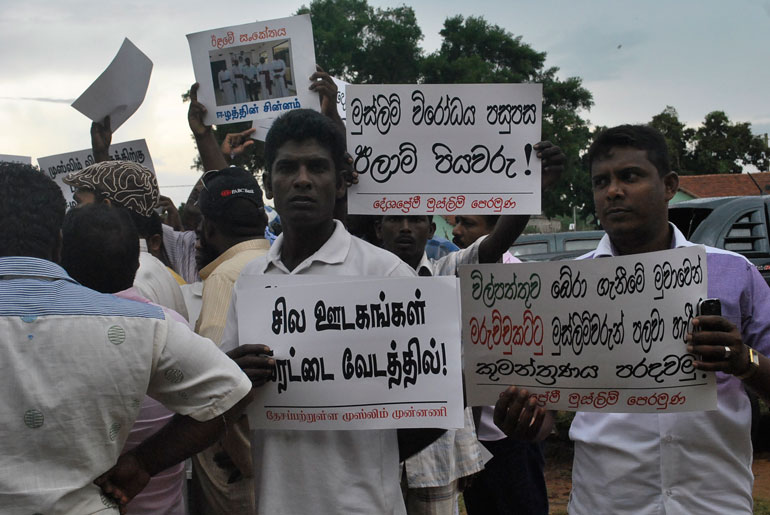
Villagers staging a demonstration in front of the Marichchikatti
Jumma Mosque
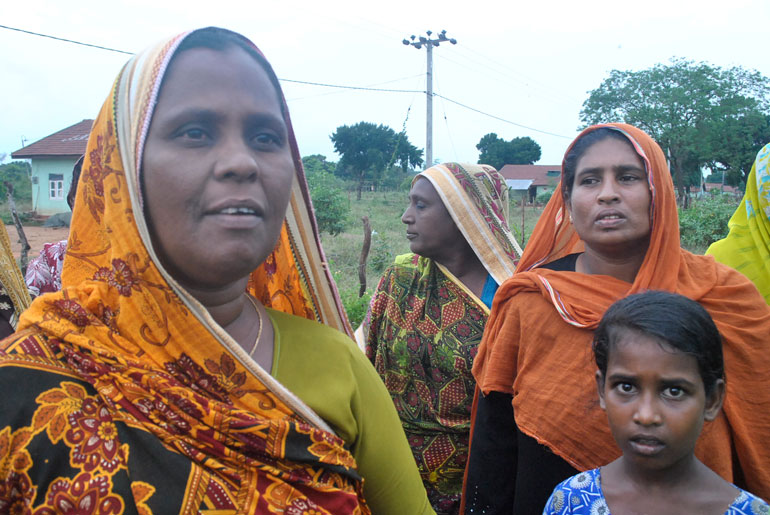
Noorjahan relating her plight
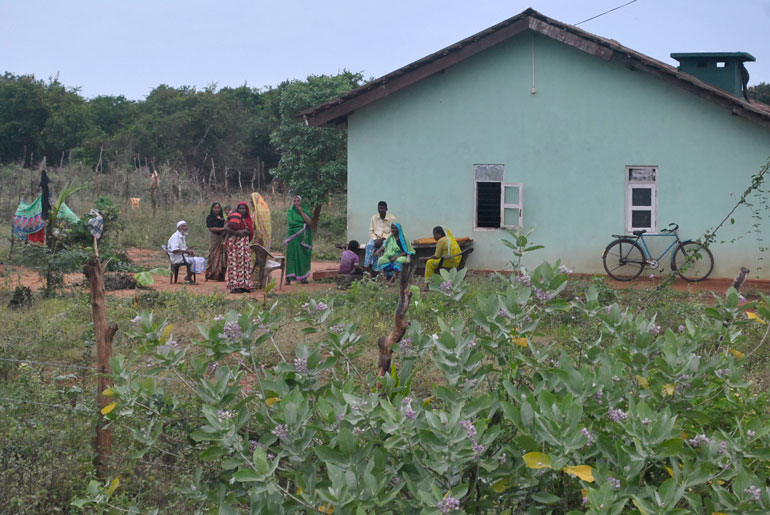
Resettled IDPs in Jassim city housing scheme
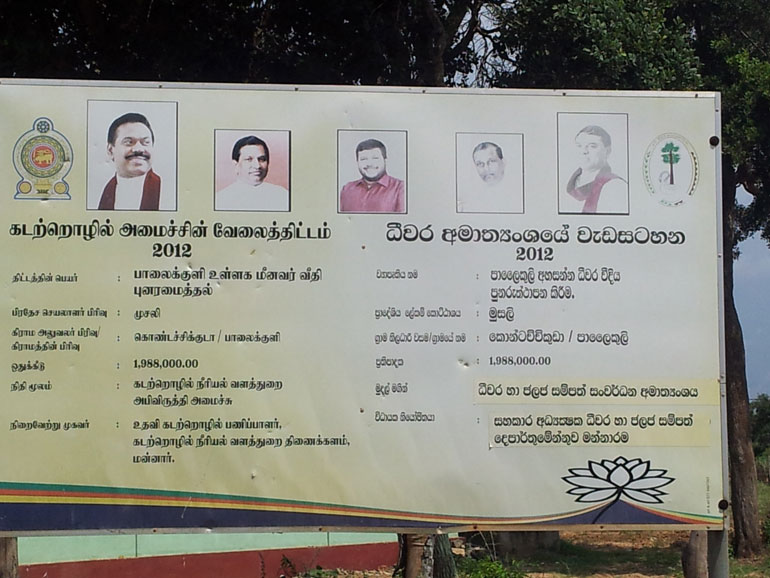
Billboard on resettlement project
By Shanika Sriyananda
Kallaru forest reserve adjoining the Wilpattu National Park is bleeding as red soil appears in a swathe of land with no trees, which were mercilessly felled down and taken to unknown destinations by unknown forces.
Makeshift huts are dotted in cleared land that runs to over thousands of hectares in the Kallaru forest reserve. The empty huts, with no signs of human living, are the remnants to prove an organised approach to set up colonies in Kallaru forest.
Leopards and large herds of elephants are hiding in the remaining forest with no help as the lands in which they used to roam freely are encroached by humans by blocking their natural paths in and around the park.
No proper plan
The ill-planned resettlement drive in Marichchakatti, where Muslim families displaced for over 20 years have been given land, has put people’s lives into danger as they have to share the land with wild animals in Wilpattu National Park.
With no proper plan for resettling IDPs, these people have been dropped in risky and difficult terrainm making their survival yet another struggle with no safe drinking water, sanitation and infrastructure facilities like roads, schools and hospitals.
The eco-groups claimed that resettling of people needs an Environmental Impact Assessment to determine facilities – like safe drinking water – for people. On the other hand, these people have been resettled in elephant corridors. This will soon aggravate the human-elephant conflict, with elephants storming into villages in search of food.
According to eco-groups, Marichchakatti is an elephant corridor and there were sign boards put up by the Department of Wildlife cautioning people about elephants crossing the roads. But these boards disappeared before clearing of land and building of makeshift houses. Now the elephant corridors are blocked by the newly-built houses and makeshift huts. Wilpattu is home to the country’s largest herd of wild elephants.
There are billboards with pictures of former President Mahinda Rajapaksa, Economics Affairs Minister Basil Rajapaksa and Minister Rishad Bathiudeen on the resettlement program.
S. Jasoor fled Marichchakatti with his family in 1990 when the LTTE ordered to leave their homes, giving them only two hours. He was just 13 years old when they fled the village leaving all their belongings behind. After living as IDPs for the last 25 years in a camp in Puttalam, they returned to their original village, Marichchakatti, recently.
“While staying in the IDP camp I went to Zahira College in Puttalam. Now I am a farmer. We need to start our lives,” he said.
Noorjahan, a mother of three, is 44 years old. Her family has been given a house at the Jassim city housing scheme. She said Marichchakatti is her father’s ancestral village and they were too born in this village.
“But in 1990, the LTTE threatened to kill us if we didn’t leave soon. We were helpless and ran empty-handed. We stayed in IDP camps for over 20 years,” she said, showing a house which has the name ‘Jassim’ painted on the roof.
“Life here is very difficult with no facilities. Water was the main problem as the old well from which we used to draw water ran dry. Now we are given tube wells but still finding water for drinking is a problem,” Noorjahan claimed.
Land grabbing and Government response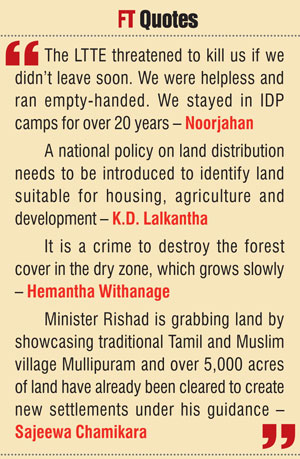
The Jassim City project was named after the Prime Minister of Qatar Sheikh Hamad Bin Jassim Bin Jabr Al-Thani, whose charity funded the housing scheme.
While these people are struggling for life in this difficult terrain, it highlights the Government’s responsibility to implement a well-designed plan to resettle IDPs.
The issue of land grabbing on a massive scale for illegal encroachments to establish colonies, timber felling and cultivation in the country’s largest and one of its oldest national parks, is unaddressed, with only talk and no action since the end of the three-decade war during the previous Government.
The issue has been simmering for a few years with the Bodu Bala Sena – a Buddhist religious group – accusing Minister Rishad Bathiudeen of illegally resettling Muslims to establish Muslim colonies during the previous regime. It has now reached boiling point with several eco groups, the public and the JVP accusing politicians of raping the Kallaru forest to create new settlements for Muslims, illegal logging to earn quick money for election campaigns, and distributing land for strengthening their vote base in the forthcoming elections.
Some interested parties with ulterior motives have attempted to twist the issue to spread their extremist stances.
While the Kallaru saga continues, President Maithiripala Sirisena, who was the former Minister of Environment, has adopted a tough stance, using his executive powers to stop all encroachment and clearing in the park and has ordered a full probe. This has prompted eco-groups and the JVP to urge the Sirisena Government to establish a powerful investigation unit to probe crimes committed against the country’s environment during the last 10 years.
JVP calls for national
land policy
“Today people are happy with the Government’s initiative to investigate financial frauds by the special unit – the Financial Crime Investigation Division of the Police. Likewise, we urge the President to form a special unit, an Environmental Crime Investigation Division, with similar powers to investigate massive environmental destruction that took place during the previous Government,” JVP Political Bureau member K.D. Lalkantha said.
He said a large swathe of forest land was sacrificed in the mega development projects carried out by the previous Government, ignoring the country’s environmental laws.
“Illegal logging, massive clearances of forest land for human settlement, cultivation and development projects and illegal sand mining have caused huge environmental destruction and those who are responsible need to be brought before the law,” he stressed, adding that the views of the officials attached to ministries and authorities related to the environment were suppressed due to political pressure.
Lalkantha said that there were river banks in which the irrigation demarcations were altered to build private houses for some politically-influential people. “There are some projects which have been completed along the river banks with no Environmental Impact Assessment and no approval from the relevant agencies,” he noted.
Lalkantha said that they agreed that the Government had a huge responsibility to resettle people in the lands where they belonged, but there was no land policy in the country to distribute lands for the third generation.
“A national policy on land distribution needs to be introduced to identify land suitable for housing, agriculture and development. Under this policy, we need to identify the land area for development, mainly from the lands in the north and east, north central and Moneragala with a lesser population and more land area for development. Accordingly, we have to resettle IDPs in land which is suitable for resettlement to avoid environmental destruction and also to protect human lives,” he said.
Forest land destroyed
Centre for Environmental Justice Executive Director Hemantha Withanage said although the previous Government under the ‘Mahinda Chinthana’ concept pledged to increase the forest cover by 35%, it has destroyed a massive portion of country’s forest land.
“Many ill-planned development projects done by the previous regime have resulted in environment destruction and created many environmental issues,” he said, adding that the main loophole was that the country lacked a national environmental policy.
“Take Hambantota Port as an example. We only talk about the financial fraud involved in the project, but it has destroyed the country’s best wetland. No one talks about this aspect. Before the port was constructed there were 15,000 flamingos in some seasons, but now there is no place for them. We don’t talk about the eco destruction in these projects,” he noted.
Withanage said as environmentalists, they have been fighting for the last 20 years to introduce the national policy and submitted a set of proposals to President Maithiripala Sirisena when he was the presidential candidate.
“He signed and agreed to take action. We are happy that he said that he used his executive powers to stop illegal land grabbing in Wilpattu. We are hopeful he will do the justice to the country’s environment,” he said.
Withanage said that it is very clear that the Department of Forest Conservation, under pressure from then Minister of Economic Development Basil Rajapaksa, had released over 2,500 acres of land without following any legal requirement.
“Now it is the responsibility of the department to correct its own mistake. We suggested that the department carry out a comprehensive study on existing forest cover and have forests maps with correct demarcations. We also suggested acquiring all lands which were grabbed illegally and to start growing trees in the damaged lands to increase the forest cover,” he said.
Withanage said it is a crime to destroy the forest cover in the dry zone, which grows slowly. “It will take over 1,000 years for a mahogany tree to reach its full growth. Trees in the dry zone grow under the prevailing dry climate with less water. It is an organised timber felling,” he claimed.
According to Withanage, divisional secretaries have no right to release land which comes under the Department of Forest Conservation. “Any land distribution needs the approval of the forest conservator after fulfilling the legal requirement under the law,” he stressed.
Violation of environment laws
and regulations
Environment Conservation Trust Director Sajeewa Chamikara said clearing of nearly 5,000 acres of land in Kallaru forest reserve is a grave violation of the country’s laws and regulations related to the environment.
He said that over 1,500 displaced people were not resettled inside the Wilpattu National Park but in the Kallaru forest reserve, which comes under the Department of Forest Conservation as it is a part of the Wilpattu National Park.
“The Mullipuram village, which is in the north of Wilpattu and 500 meters away from Modaraaru, was a traditional village where Tamils and Muslims lived. In that fishing village, the majority were Tamils. During former President Premadasa’s regime, more people were resettled and it became a large settlement with 130 families, but they moved to other areas due to the war. There are remnants of a Mosque. Later 1,200 acres of land were acquired by the Sri Lanka Navy during the war. Minister Rishad Bathiudeen is grabbing land by showcasing this village and over 5,000 acres of land have already been cleared to create new settlements under his guidance,” he claimed.
Explaining the importance of preserving Kallaru forest as it belongs to the Wilpattu forest network, he said it was the water catchment area of the Kallaru River and Modaragamaru Oya, which is in the north of the Wilpattu National Park.
He said resettlement in the Kallaru forest started in 2011 and 2012 during the Mahinda Rajapaksa regime under the Northern Spring (Uthuru Wasanthaya) project implemented by former Economic Development Minister Basil Rajapaksa.
Chamikara claimed the resettlement of people in the Kallaru forest was a violation of the Forest Conservation Ordinance, National Environment Act, Flora and Fauna Protection Act and the Antiquities Ordinance.
Citing the provisions of Gazette notification 772/22 published on 24 July 1993, he said when clearing any forest over one hectares for any development project or to resettle 100 families, carrying out an Environment Impact Assessment (EIA) was compulsory to obtain approval. “As the Kallaru forest comes under the Forest Conservation Ordinance, no temporary or permanent resettlement is allowed and also construction of buildings, clearing the forest or any human activity such as agriculture and hunting are prohibited, ” he said, adding nothing of these legal factors were considered when resettling people in the area.
Pix by Shanika Sriyananda
In a packed media conference held at the Marichchakatti Jumma Mosque, Commerce and Trade Minister Rishad Bathiudeen strongly refuted the allegations levelled against him of attempting to create Muslim colonies in Wilpattu. Following are the excerpts of his explanations to questions raised by the journalists:
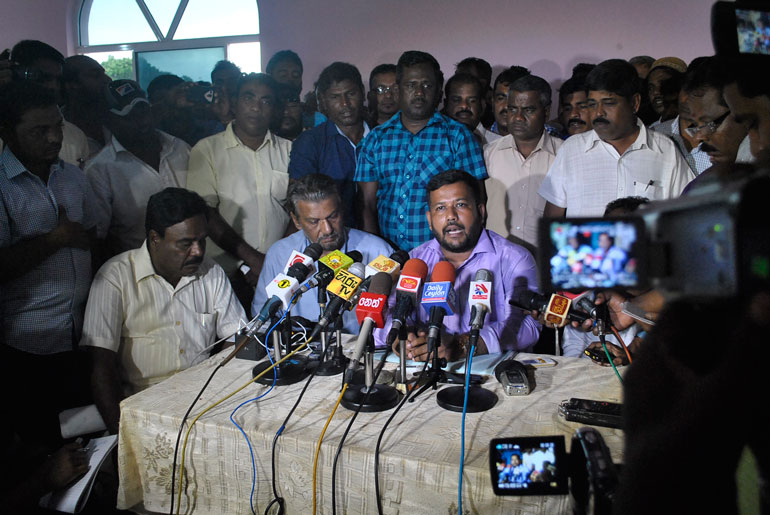
Minister Rishad Bathiudeen addressing the media
“I say this with responsibility that no one is resettled in or on the borders of the Wilpattu Park. We also love to protect our forests and will not allow to destroy the forest. I challenge anyone to come forward to prove that there are illegal settlers resettled by me.
“On 27 October 1990, Muslims in Mullikulam, Marichchakatti, Tharadikulli and Palakulli villages were given only two hours by the LTTE to leave their villages. Most of them fled to Puttalam and some to Kalpitiya by boats. There were 168 IDP centres in Puttalam. In 2010, with the dawn of peace, they were requested to return to their villages but they had to wait till the Government completed mine clearing in their villages. There were three mosques at Karadikuli, Palikulli and Marichchakatti and old wells used by the villages but there were no houses.
“I clearly say that there is no one outside of the north or any other nationals among these resettled people. Anyone can check this by going through the electoral register in these areas, which has their names since 1990. According to the recommendations of the LLRC, the previous Government decided to resettle all IDPs in their original lands after providing them with houses and infrastructure facilities. The Presidential Task Force to look into resettlement process was appointed together with a sub-committee including all Environment, Wildlife, Economic Affairs and Defence Ministries. This committee was represented by all the relevant Government officials from grama sevakas to ministry secretaries. They followed all the proper procedures in resettling these people.
“Over 100,000 Muslims were chased away from their villages during the war but only 30,000 Muslims have been resettled up to now. The balance 70,000 are still in Puttalam, Anuradhapura and other districts. Out of 30,000, only 2,000 people are living here in these villages. These people came here as they are given Rs. 50,000 each to have temporary shelters through the divisional secretary last December. Out of the 2,000 people, most of them have returned to Puttalam or other districts as life in these villages is difficult with no infrastructure facilities.
“I requested President Sirisena to appoint a committee and take tough action against those who have violated the correct procedures in resettling these people. I also request the people of Sri Lanka and the Government not to do any injustice to these people who are returning their homelands after 25 years of displacement.”